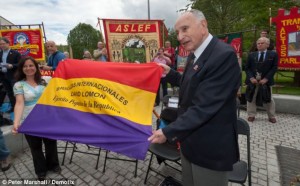David Lomon, last British IBer (1918-2012)
This obituary appeared in the 34th issue of the newsletter of the International Brigade Memorial Trust and is reprinted here with the IBMT’s permission.
David Lomon, who died on 21 December 2012, aged 94, was the last known survivor in Britain of the more than 2,500 volunteers from the British Isles who joined the International Brigades.
His active service in the Spanish Civil War was relatively brief, and he spent nearly seven of his 10 months in Spain as a prisoner of war. But the experience left its mark on him: he retained a life-long love of Spain and he was always proud of the ideals that had prompted him tojoin the anti-fascist fight in a foreign land at the age of 19. In one of his last interviews, given in Madrid only seven weeks before his sudden death, he said tha tjoining the International Brigades had been the best thing he had done in his life.
Lomon was in the Spanish capital in November 2012 to participate in events marking the 76th anniversary of the defense of Madrid in the early months of the civil war, when Franco’s rebel army, backed by Hitler and Mussolini, threatened to overrun the city and achieve a swift victory over the Spanish Republic. It was during these battles that the intervention of the International Brigades–volunteers from around the world who opposed the policy of “non¬intervention” sponsored by Britain and France–played a crucial role in halting the fascist advance.
Though born in Manchester (on 22 November 1918), the youngest of eight children, Lomon had been working in the garment trade in London’s East End when he arrived in Spain in De¬cember 1937. Already bloodied in street clashes with the Blackshirts of the British Union of Fascists, in Spain he changed his surname Solomon to Lomon to disguise its Jewishness from potential fascist captors. He recounted years later: “I wanted to go to Spain, so I joined the Young Communist League just because, I thought, these are the people who I could use to get to Spain… I wanted to do something. I wanted to fight fascism.”
He had made his way through France by train, entering Spain after an exhausting overnight climb over the Pyrenees to avoid the French border guards and international non-intervention monitors. After less than three weeks of training as a machine¬gunner at the British Battalion’s base at Tarazona de la Mancha, he was rushed to the front to shore up the Republic’s lines as Franco’s waged a huge counter-offensive to retake the city of Teruel. Then in the spring of 1938 Lomon was taken prisoner by Italian troops as they pushed eastwards through Aragon towards the Mediterranean.
Along with over 100 other captured Britons, Lomon was imprisoned in the concentration camp of San Pedro de Cardeña, near Burgos, and afterwards at an Italian-run prisoner-of-war camp outside Palencia. There, he was sketched by another British Battalion prisoner, the artist Clive Branson. They were among a group of British prisoners repatriated in October 1938 in an exchange for Italian soldiers. Branson died in Burma in 1944 and the sketch remained unseen by Lomon until April last year, when he visited the Marx Memorial Library in London to view Branson’s sketchbook, which had only recently been deposited at the library’s Internaional Brigade archive.
Seeing the Branson sketch rekindled long-forgotten memories for David. At the Palencia prison he recalled how he and fellow POWs made up their own lyrics when they sang “Jarama Valley”, the song originally penned by Glaswegian volunteer Alex McDade and then anonymously rewritten to become the unofficial song of the British Battalion. Sung to the tune of “Red River Valley”, they would sing:
There’s a prison in Spain called Palencia
’Tis a place that we know all too well
It was there that we gave of our manhood
And spent months of misery and hell.
Surrounded one day by Italians
Who with guns bought by Chamberlain’s gold
Blown to hell by artillery and avion
That’s how our brave comrades were sold.
During the Second World War Lomon served on Royal Navy minesweepers in the English Channel and the Far East. Following the war, he returned to the garment trade, working as a hand¬cutter for Barnett Lawson Trimmings in London, and to family life–he had married Millie Levine in 1939 and they had two sons and a daughter. Years earlier he had left the YCL– where he had met Millie–and switched allegiances to Labour, in part out of disappointment with the Hitler-Stalin pact of August 1939.
On retirement, by which time he was the managing director at Barnett Lawson, he lived for two years in Spain before settling in Bexhill and, following Millie’s death 15 years ago, relocating to Bourne End, Buckinghamshire, to be closer to one of his sons.
The final two years of his life saw him play an active part in events in Britain and Spain to commemorate the International Brigades, having made contact with the IBMT after reading an article in the April 2009 issue of Saga Magazine about the few remaining British veterans.
In October 2011 hejoined three former comrades from France and Estonia in Madrid to mark the 75th anniversary of the formation of the International Brigades. Speaking at the inauguration of a memorial to the Brigades in the University City, he said: “The ideals of the international volunteers will never be forgotten. Even though we lost the so-called civil war, the democratic powers realized that fascism must be stopped, or they too would suffer the same fate as Spain.”
He was awarded Spanish citizenship in 2009, and in July 2012 unveiled a plaque beside the International Brigade memorial in Jubilee Gardens on London’s South Bank.
David Lomon’s speech in Madrid on 10 November 2012 can be seen just over halfway through this video.













